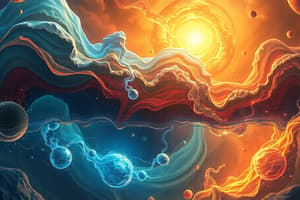Podcast
Questions and Answers
Which type of change involves altering a substance's chemical composition?
Which type of change involves altering a substance's chemical composition?
- Freezing
- Physical change
- Melting
- Chemical change (correct)
During a physical change, what happens to the substance's chemical composition?
During a physical change, what happens to the substance's chemical composition?
- It breaks down existing compounds
- It remains the same (correct)
- It forms new compounds
- It turns into a different substance
What indicates a chemical change?
What indicates a chemical change?
- Altering physical appearance
- Maintaining original properties
- Changing from solid to liquid
- Formation of new compounds (correct)
What is an example of a physical change?
What is an example of a physical change?
Which process involves changes between the solid, liquid, and gaseous states of matter?
Which process involves changes between the solid, liquid, and gaseous states of matter?
What is the temperature at which a substance transitions from its solid state to its liquid state called?
What is the temperature at which a substance transitions from its solid state to its liquid state called?
Which change cannot be undone by returning the substance to its original state?
Which change cannot be undone by returning the substance to its original state?
What is the highest temperature at which a substance can be a liquid called?
What is the highest temperature at which a substance can be a liquid called?
Which process involves turning liquid water into water vapor when exposed to heat?
Which process involves turning liquid water into water vapor when exposed to heat?
What is an example of a reversible change?
What is an example of a reversible change?
Flashcards are hidden until you start studying
Study Notes
Changes in Matter: Understanding the Transformation of Substances
Matter, the fundamental constituent of the universe, exists in various forms and undergoes transformations through diverse processes. Understanding these changes is crucial for our daily lives, scientific inquiry, and technological advancements. In this article, we explore the concept of changes in matter, focusing on physical and chemical transformations, as well as related subtopics.
1. Physical Changes
Physical changes involve altering the appearance or state of a substance without changing its chemical composition. Examples of physical changes include melting, freezing, condensation, and evaporation. During these processes, the substance maintains its identity, but its physical properties change. For example, solid water (snow) can turn into liquid water (water) through a physical change called melting.
2. Chemical Changes
Chemical changes involve altering a substance's chemical composition by forming new compounds or breaking existing ones down. These transformations often involve changes in the substance's appearance, color, odor, or properties. A chemical change is irreversible, meaning that the original substance cannot be recovered in its original form. For example, when burning a candle, the wax combines with oxygen to produce carbon dioxide and water vapor, indicating a chemical change.
3. Reversible and Irreversible Changes
Reversible changes can be undone by returning the substance to its original state. Melting and freezing water are examples of reversible changes, as ice can be turned back into liquid water. In contrast, irreversible changes cannot be undone by returning the substance to its original state. Examples of irreversible changes include burning, rusting, and digestion.
4. Solidification, Liquefaction, and Vaporization
Solidification, liquidefaction, and vaporization are processes that involve changes between the solid, liquid, and gaseous states of matter. For instance, ice (solid water) can turn into liquid water (melting) when it absorbs heat, and liquid water can become water vapor (evaporation) when exposed to heat.
5. Solidification and Melting Points
The temperature at which a substance transitions from its solid state to its liquid state is called the melting point. Conversely, the temperature at which a liquid transitions to a solid is called the freezing point. For instance, water's melting point is 0°C (32°F), and its freezing point is 0°C (32°F) as well.
6. Solidification and Boiling Points
The temperature at which a substance transitions from its solid state to its gaseous state is called the boiling point. For instance, water's boiling point is 100°C (212°F). The boiling point is the highest temperature at which a substance can be a liquid, and it varies depending on the atmospheric pressure.
Conclusion
Changes in matter are a fundamental concept in the natural world and are essential for our understanding of science, technology, and everyday life. By recognizing and understanding these transformations, we can better appreciate the world around us and develop new ways to interact with it.
Studying That Suits You
Use AI to generate personalized quizzes and flashcards to suit your learning preferences.




